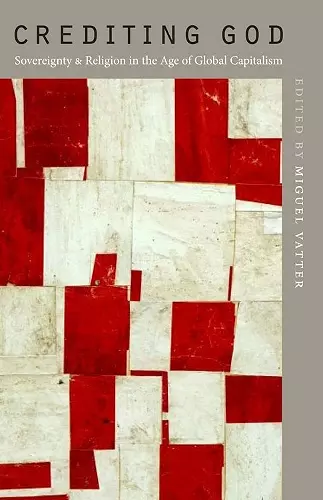Crediting God
Sovereignty and Religion in the Age of Global Capitalism
Format:Paperback
Publisher:Fordham University Press
Published:3rd Jan '11
Currently unavailable, and unfortunately no date known when it will be back
This paperback is available in another edition too:
- Hardback£79.00(9780823233199)

Tocqueville suggested that "the people reign in the American political world like God over the universe.” This intuition anticipates the crisis in the secularization paradigm that has brought theology back as a fundamental part of sociological and political analysis. It has become more difficult to believe that humanity’s progress necessarily leads to atheism, or that it is possible to translate all that is good about religion into reasonable terms acceptable in principle by all, believers as well as nonbelievers. And yet, the spread of Enlightenment values, of an independent public sphere, and of alternative “projects of modernity” continues unabated and is by no means the antithesis of the renewed vigor of religious beliefs.
The essays in this book shed interdisciplinary and multicultural light on a hypothesis that helps to account for such an unexpected convergence of enlightenment and religion in our times: Religion has reentered the public sphere because it puts into question the relation between God and the concept of political sovereignty.
In the first part, “Religion and Polity-Building,” new perspectives are brought to bear on the tension-ridden connection between theophany and state-building from the perspective of world religions. Globalized, neo-liberal capitalism has been another crucial factor in loosening the bond between God and the state, as the essays in the second part, “The End of the Saeculum and Global Capitalism,” show.
The essays in the third part, “Questioning Sovereignty: Law and Justice,” are dedicated to a critique of the premises of political theology, starting from the possibility of a prior, perhaps deeper relation between democracy and theocracy. The book concludes with three innovative essays dedicated to examining Tocqueville in order to think the “Religion of Democracy” beyond the idea of civil religion.
"Crediting God is a welcome, multidisciplinary contribution to current debates about sovereignty, political theology, and secularism. Ranging across a variety of religious traditions--including Confucianism, Islam, Hinduism, Judaism, and Christianity--the engaging essays that Miguel Vatter brings together in this volume challenge and deepen our understanding of the political significance of religious fundamentalisms." -- -Robert Gooding-Williams The University of Chicago "This volume edited by Miguel Vatter provides an illuminating and disorienting set of reflections about the relationship between sovereignty, theocracy, secularization, questioning whether the progressive or negative accounts of history that see religion falling away misread the way that religion circulates, and the various forms in which it appears. These essays do not offer a single conclusion on this vast and important topic, but offer a complex and compelling constellation of views, offering a way to rethink the historical presuppositions of secularism and capitalism, the tacit presuppositions of sovereignty, and the prospects for thinking anew the relation between religion and democracy. In now way trying to provide a comprehensive account of world religions, this volume pivots instead on how capitalism seizes on religion even as religion remains and returns to those democratic theories, in occasionally messianic terms, that announce its final overcoming. This is a surprising, erudite, and provocative collection." -- -Judith Butler University California, Berkeley "This volume, competently edited and introduced by Miguel Vatter, is one of the most rigorous and complete presentations of the complex relation between theology and politics around today. Historical references and theoretical questions, issues of dogma and political analyses, intersect around one and the same nucleus of sense which sheds new light on the dynamics and the conflicts of the globalized world." -- -Roberto Esposito Italian Institute of Human Sciences (Istituto Italiano di Scienze Umane) "Crediting God is a timely contribution to the current debate about the continuing -- perhaps growing - social, political and economic importance of religion. Miguel Vatter has assembled an impressive collection of essays by distinguished writers who recast familiar texts in new ways that effectively advance critical debate on this urgent subject." -- -Mark C. Taylor Columbia University "This is unquestionably a major contribution to our much needed understanding of the imbrication of religion and politics, theology and secularism, faith and reason, belief and agnosticism, sovereignty and monotheism that shows how religion has not, will not, and cannot simply whither away. At the heart of this book is the ever generative problematic of the relationship between sovereignty and transcendence, namely whether political orders require of some non-internal source of legitimacy; whether, that is, their legitimacy are always under contestation. But instead of showing this to be a vicious circle, these essays collectively show that the tension between religious transcendence and political immanence is the source of the vitality of the both realms. The book also shows how it is that the Enlightenment did not mean the end of religion, but the awakening of enlightened religions. The other side of fundamentalism is not a blind and intolerant secularism, but an enlightened religion that is not the competitor of an ecumenical and post-metaphysical reason but its complement, interlocutor and instigator of new moral insights. To paraphrase Habermas, secularization and enlightenment have not been a zero sum process for either religion or the political realm, both have benefited. This stellar group of international scholar illustrate through a cross cultural and cross-historical analyses the interpenetration between processes of secularization that result in catalyzation of religious revivals, and the emergence of political institutions precisely due to those religious fervors. The discussions of Strauss, Schmitt, Benjamin, Hobbes, and above all Tocqueville are superlative, enlightening, and in many cases, pioneering. I think that both the general public and more specialized scholars will find this an outstanding book." -- -Eduardo Mendieta Stony Brook University
ISBN: 9780823233205
Dimensions: unknown
Weight: unknown
374 pages